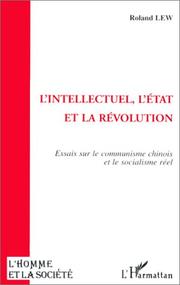
ISBN: 2738458653 Year: 1997 Publisher: Paris L'Harmattan
Abstract | Keywords | Export | Availability | Bookmark
 Loading...
Loading...Choose an application
- Reference Manager
- EndNote
- RefWorks (Direct export to RefWorks)
S06/0405 --- China: Politics and government--CCP, history and ideology: general --- Communism --- Socialism --- Intellectuals --- Communisme --- Socialisme --- Intellectuels --- China --- Chine --- Politics and government --- Politique et gouvernement --- Communism and intellectuals --- Intellectuals and communism
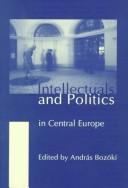
ISBN: 963911622X 9639116211 Year: 1999 Publisher: Budapest Central European university press
Abstract | Keywords | Export | Availability | Bookmark
 Loading...
Loading...Choose an application
- Reference Manager
- EndNote
- RefWorks (Direct export to RefWorks)
Intellectuals --- Communism and intellectuals --- Intellectuels --- Communisme et intellectuels --- Congresses --- Congrès --- Europe, Eastern --- Europe de l'Est --- Politics and government --- Politique et gouvernement --- #SBIB:324H31 --- #SBIB:328H27 --- #SBIB:IEB --- Intelligentsia --- Intellectuals and communism --- Intellectuelen, politiek-maatschappelijk debat --- Instellingen en beleid: Midden- en Centraal Europa: algemeen --- East Europe --- Eastern Europe --- Congresses. --- Persons --- Social classes --- Specialists
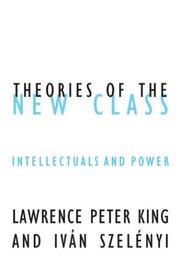
ISBN: 081664344X 0816643431 Year: 2004 Publisher: Minneapolis, Minn. University of Minnesota Press
Abstract | Keywords | Export | Availability | Bookmark
 Loading...
Loading...Choose an application
- Reference Manager
- EndNote
- RefWorks (Direct export to RefWorks)
Communism and intellectuals --- Power (Social sciences) --- Socialism --- 316.342.2 --- #SBIB:044.AANKOOP --- Marxism --- Social democracy --- Socialist movements --- Collectivism --- Anarchism --- Communism --- Critical theory --- Empowerment (Social sciences) --- Political power --- Exchange theory (Sociology) --- Political science --- Social sciences --- Sociology --- Consensus (Social sciences) --- Intellectuals and communism --- Intellectuals --- Political philosophy. Social philosophy --- Political sociology
Book
ISBN: 9568416250 2821895860 Year: 2011 Publisher: Santiago Ariadna Ediciones
Abstract | Keywords | Export | Availability | Bookmark
 Loading...
Loading...Choose an application
- Reference Manager
- EndNote
- RefWorks (Direct export to RefWorks)
The Cold War represented an unprecedented scenario for the intellectuals of Latin America that prompted them to intervene, as never before, in a world-class conflict. Writers, artists, essayists and critics were called to play an active role in a warlike conflict that was fought with "unconventional" weapons: ideas, speeches, propaganda. This is the story of how these intellectuals became an actor who participated in the Cold War, exercising their own power, the specific power of intellectuals. The story of how they engaged with causes, emblems, and ideologies; of how they were almost always guided by ethical principles and by the responsibility with which they assumed the representation of the peoples of the continent and even of the Third World; of how they defended, ultimately, the autonomy of the intellectual field in the face of local and global political forces.
Cold War --- Intellectuals --- Communism and intellectuals --- Social aspects --- Political activity --- History --- Latin America --- Intellectual life --- Politics and government --- Relations --- Intellectuals and communism --- Persons --- Social classes --- Specialists --- Intelligentsia --- World politics --- Asociación Latinoamericana de Libre Comercio countries --- Neotropical region --- Neotropics --- New World tropics --- Spanish America --- guerras --- Guerra Fría --- propaganda
Book
ISBN: 303098561X 3030985628 Year: 2022 Publisher: Cham : Springer International Publishing : Imprint: Palgrave Macmillan,
Abstract | Keywords | Export | Availability | Bookmark
 Loading...
Loading...Choose an application
- Reference Manager
- EndNote
- RefWorks (Direct export to RefWorks)
This book investigates a central chapter in the history of 20th century intellectualism: the commitment to the communist ideal and the Soviet Union. Focusing on Argentina, whose communist party was among the most important in Latin America, Petra engages with the current literature on Western communism in order to conduct an exhaustive study of the intellectuals, cultural organizations, publications, and debates within Argentine communism in the decades following World War II. Based on rigorous archival research from diverse sources, Petra’s book distances itself from existing teleological visions and institutional approaches to the communist world, offering instead a complex framework in which multiple contexts, scales, and actors frame the larger problem: the intellectual commitment to a political project that brooked no dissent. Intellectuals and Communist Culture also addresses the emergence of Peronism, a crucial movement in Argentine political life to this very day, thus offering an important chapter on Latin American political and intellectual history and an invaluable contribution to the global history of the international communist movement. Adriana Petra is Researcher at the National Council for Scientific and Technical Research of Argentina and Professor at the School of Humanities of the National University of San Martín, Argentina.
Communism and intellectuals --- History --- Argentina --- Intellectual life --- Intellectuals and communism --- Intellectuals --- Political science. --- World politics. --- Latin America --- Political Theory. --- Political History. --- Latin American History. --- Political Science. --- History. --- Colonialism --- Global politics --- International politics --- Political history --- Political science --- World history --- Eastern question --- Geopolitics --- International organization --- International relations --- Administration --- Civil government --- Commonwealth, The --- Government --- Political theory --- Political thought --- Politics --- Science, Political --- Social sciences --- State, The
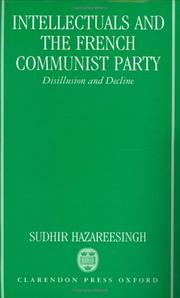
ISBN: 0198278705 Year: 1991 Publisher: Oxford Clarendon Press
Abstract | Keywords | Export | Availability | Bookmark
 Loading...
Loading...Choose an application
- Reference Manager
- EndNote
- RefWorks (Direct export to RefWorks)
Communism and intellectuals --- -Intellectuals and communism --- Intellectuals --- Parti communiste francais --- Parti communiste (France) --- Frant︠s︡uzskai︠a︡ kommunisticheskai︠a︡ partii︠a︡ --- Kommunisticheskai︠a︡ partii︠a︡ Frant︠s︡ii --- Ḥizb al-Shuyūʻī al-Faransī --- Französische Kommunistische Partei --- Communist Party (France) --- French Communist Party --- Partido Comunista Francés --- PCF (Parti communiste français) --- Partito comunista francese --- Kommunistische Partei Frankreichs --- KPF --- FKP --- Francuska Partia Komunistyczna --- P.C.F. (Parti communiste français) --- K.P.F. --- F.K.P. --- Francouzská komunistická strana --- P.C. (Parti communiste français) --- PC (Parti communiste français) --- Communist International. --- S.F.I.C. --- SFIC --- Parti socialiste-S.F.I.O. --- -Parti communiste francais --- Intellectuals and communism --- Parti communiste français. --- France --- Intellectual life --- Politics and government --- 1945 --- -Communism and intellectuals - France. --- Parti communiste francais. --- France - Politics and government - 1945 --- -Communism and intellectuals --- Đảng cộng sản Pháp --- Communism and intellectuals - France. --- France - Politics and government - 1945-
Book
ISBN: 3839434181 3837634183 Year: 2017 Publisher: Bielefeld, Germany transcript Verlag
Abstract | Keywords | Export | Availability | Bookmark
 Loading...
Loading...Choose an application
- Reference Manager
- EndNote
- RefWorks (Direct export to RefWorks)
Left-wing intellectuals in Britain and the US had long repudiated the Soviet regime. Why was the collapse of the Eastern Bloc experienced as a shock that destabilised their identities and political allegiances then? What happened to a collective project that had started out to formulate a socialist vision different from both really existing socialism and social democracy? This study endeavours to answer both questions, focusing on generational networks rather than individuals and investigating political academic journals after 1989 to paint the picture of a Left deeply troubled by the triumph of a capitalism unfettered by any counter-force. »The value of this work lies not in its novelty, but rather in Berg's remarkable achievement of meticulously cataloging oppositional thought.« A. Shahid Stover, connections, 22.02.2019 »This study can only be recommended to every reader.« Christian Huck, Anglistik, 29/2 (2018) Besprochen in: https://s-usih.org, 1 (2019), Michael J. Kramer
Communism and intellectuals --- Socialism --- Sociology (General) --- American History. --- Britain. --- British History. --- History. --- Intellectuals. --- North America. --- Political Science. --- Political Sociology. --- Politics. --- Socialism. --- Sociology. --- United States. --- SOCIAL SCIENCE / Sociology / General. --- Intellectuals and communism --- Intellectuals --- Left; Socialism; Intellectuals; Britain; United States; North America; History; Politics; Political Sociology; British History; American History; Political Science; Sociology --- Communism and intellectuals. --- Radicalism. --- Extremism, Political --- Ideological extremism --- Political extremism --- Political science --- Sociology --- Left --- Britain --- United States --- North America --- History --- Politics --- Political Sociology --- British History --- American History --- Political Science
Book
ISBN: 0520303695 0520972821 9780520972827 Year: 2019 Publisher: Oakland University of California Press
Abstract | Keywords | Export | Availability | Bookmark
 Loading...
Loading...Choose an application
- Reference Manager
- EndNote
- RefWorks (Direct export to RefWorks)
A free ebook version of this title is available through Luminos, University of California Press's Open Access publishing program. Visit www.luminosoa.org to learn more. This book is freely available in an open access edition thanks to TOME (Toward an Open Monograph Ecosystem)-a collaboration of the Association of American Universities, the Association of University Presses, and the Association of Research Libraries-and the generous support of the University of California, Davis. Learn more at the TOME website, available at: openmonographs.org.Creating the Intellectual redefines how we understand relations between intellectuals and the Chinese socialist revolution of the last century. Under the Chinese Communist Party, "the intellectual" was first and foremost a widening classification of individuals based on Marxist thought. The party turned revolutionaries and otherwise ordinary people into subjects identified as usable but untrustworthy intellectuals, an identification that profoundly affected patterns of domination, interaction, and rupture within the revolutionary enterprise. Drawing on a wide range of data, Eddy U takes the reader on a journey that examines political discourses, revolutionary strategies, rural activities, urban registrations, workplace arrangements, organized protests, and theater productions. He lays out in colorful detail the formation of new identities, forms of organization, and associations in Chinese society. The outcome is a compelling picture of the mutual constitution of the intellectual and the Chinese socialist revolution, the legacy of which still affects ways of seeing, thinking, acting, and feeling in what is now a globalized China.
Communism and intellectuals --- Social stratification --- History --- China --- Intellectual life --- Stratification, Social --- Equality --- Social structure --- Social classes --- Intellectuals and communism --- Intellectuals --- HISTORY / Asia / General. --- associations. --- chinese communist party. --- chinese society. --- compelling. --- formation of new identities. --- forms of organization. --- globalized china. --- intellectuals and chinese socialist revolution. --- marxist classification of individuals. --- organized protests. --- political discourses. --- revolutionary strategies. --- rural activities. --- study of chinese communism. --- theater productions. --- urban registrations. --- workplace arrangements. --- HISTORY / Asia / General
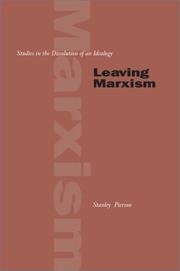
ISBN: 0804744041 9780804744041 0585457832 9780585457833 0804780277 Year: 2001 Publisher: Stanford, Calif. Stanford University Press
Abstract | Keywords | Export | Availability | Bookmark
 Loading...
Loading...Choose an application
- Reference Manager
- EndNote
- RefWorks (Direct export to RefWorks)
The collapse of Marxism as a compelling ideology and political force is one of the most important developments in the history of twentieth-century Europe. This book seeks to understand the failure of Marxism by viewing it up close, in the experiences of three important Marxist intellectuals—the Belgian Henri De Man, the German Max Horkheimer, and the Pole Leszek Kolakowski—each of whom embraced Marxism early in life and later decisively rejected it. The author focuses on the processes through which these three figures lost their faith in Marxism, thereby providing the framework for a more general account of modern ideological disenchantment. An introductory chapter surveys an earlier stage of that disenchantment by examining the appeal of Nietzsche and his concept of the superman to Marxist intellectuals in each of the major European socialist movements, focusing particularly on those who have lost confidence in the redemptive historical role of the proletariat. In studying the ideological trajectory of De Man, Horkheimer, and Kolakowski, the author identifies the common dilemmas they faced in their efforts to advance the Marxist cause. Those dilemmas arose in large part out of the clash between their bourgeois ethical sensibilities and the materialistic and deterministic outlook of orthodox Marxism. This clash provides a connecting link between the three generations of Marxist intellectuals dealt with in the study. The author also discusses the aftermath of these three versions of ideological disenchantment—the attempts of each of these intellectuals to reconstruct a view of the world following the dissolution of his Marxist faith. The book concludes by placing Marxism in a broad historical context, and raises questions about its place—and that of the utopian imagination in general—within Western civilization.
Communism and intellectuals --- #SBIB:321H60 --- Intellectuals and communism --- Intellectuals --- Westerse politieke en sociale theorieën vanaf de 19e eeuw: socialisme, marxisme, communisme, anarchisme --- Man, Hendrik de, --- Horkheimer, Max, --- Koakowski, Leszek. --- Horḳhaimer, M. --- הורקהיימר, מקס --- 霍克海默尔, --- Хоркхаймер, Макс, --- Khorkkhaĭmer, Maks, --- Man, Henri de, --- De Man, Hendrik, --- Man, Henry de, --- De Man, Henry, --- De Man, Henri, --- מאן, הענריק דע --- Kołakowski, Leszek. --- Kolakowski, Leszek. --- de Man, Hendrik. --- De Man, Henri --- De Man, Henry --- Man, Hendrik de --- Man, Henri de --- De Man, Hendrik --- Man, Henry de --- de Man, Hendrik
Book
ISBN: 2020049422 9782020049429 Year: 1978 Publisher: Paris Seuil
Abstract | Keywords | Export | Availability | Bookmark
 Loading...
Loading...Choose an application
- Reference Manager
- EndNote
- RefWorks (Direct export to RefWorks)
Jeunesse --- Youth --- Refugees --- China --- Chine --- Social conditions --- Rural conditions --- Conditions sociales --- Conditions rurales --- Communism and intellectuals --- Intellectual life --- 308 <510> --- S06/0437 --- S14/0605 --- S11/0745 --- S04/0921 --- S06/1058 --- S11/0506 --- S11/0731 --- -#SML: Joseph Spae --- Young people --- Young persons --- Youngsters --- Youths --- Age groups --- Life cycle, Human --- Intellectuals and communism --- Intellectuals --- China: Politics and government--Policy towards intellectuals (incl. "thought reform", "brainwashing") --- China: Education--Students and student movements: since 1949 --- China: Social sciences--Sexual life: since 1949 --- China: History--PRC: 1966 - 1976 --- China: Politics and government--Xiafang (sending down to the villages) --- China: Social sciences--Daily life: 1966-1976 --- China: Social sciences--Childhood, youth --- Intellectual life. --- Communism and intellectuals. --- 924 --- geschiedenis Azië --- histoire Asie --- Youth - China --- China - Intellectual life

 Search
Search Feedback
Feedback About UniCat
About UniCat  Help
Help News
News